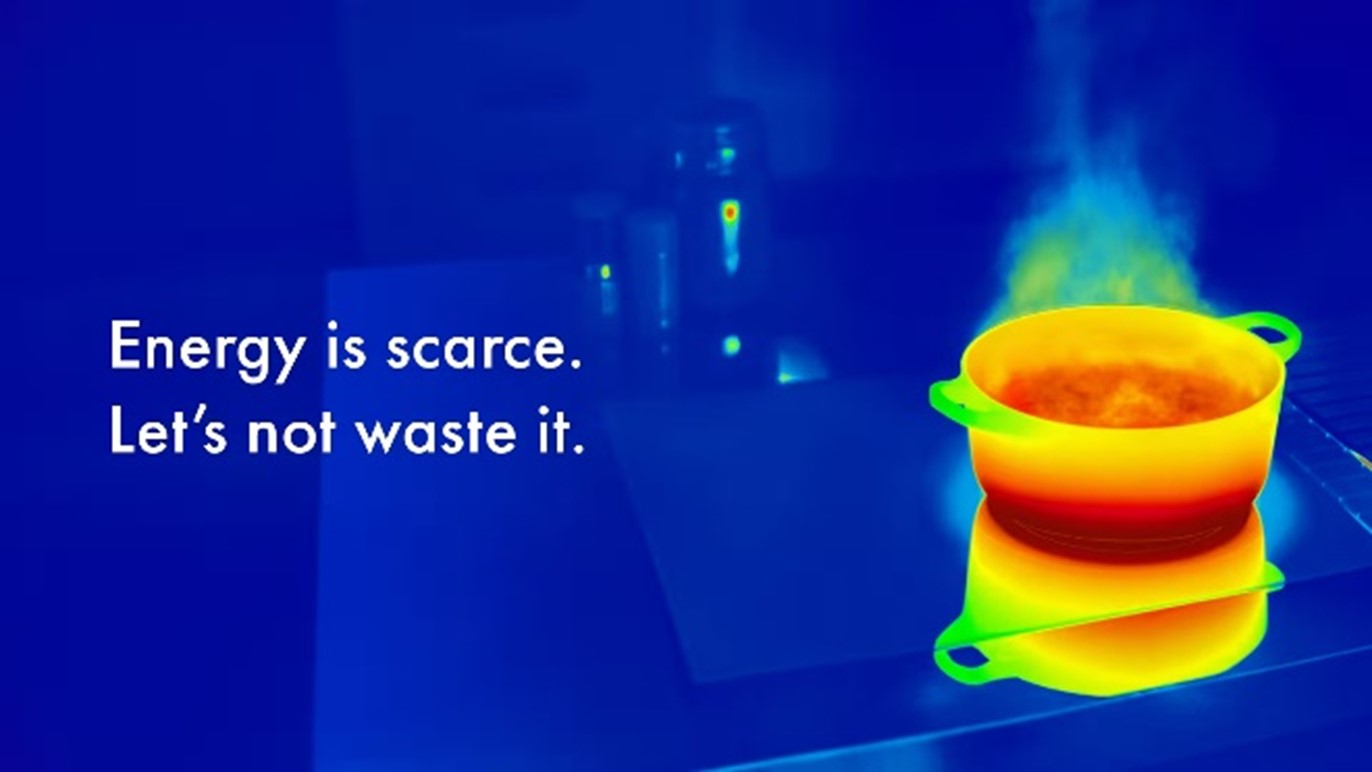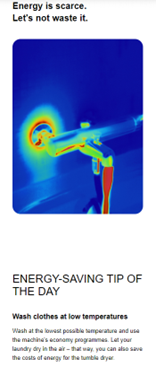Case Study Overview
Russia’s war on Ukraine led to major uncertainties regarding the supply of gas and electricity in Switzerland. To quickly strengthen the energy supply for the winter of 2022/2023 and to avoid a shortage of gas and/or electricity, the Federal Council decided to put in place a number of measures, including the “Winter Energy Saving Initiative” (WESPI) launched on 31 August 2022.
Design
Target audience Target audience: Households and businesses.
Objectives and message: The WESPI (Winter Energy Savings Initiative) consists of two parts:
- An energy-saving campaign targeted at private households, launched 31 August 2022, and
- An Energy Saving Alliance which includes organisations supporting efforts to ensure security of supply.
The campaign was implemented by the Swiss Federal Office of Energy (SwissEnergy in particular). Under the slogan “Energy is scarce. Let’s not waste it”, the campaign informed private households about the current energy situation through its website and disseminated short and easy-to-implement energy-saving tips via traditional advertising (e.g. posters, etc.) as well as online advertising and social media tools. During the first phase, the campaign aimed to increase knowledge and awareness of the current situation, and leverage this to trigger small behavioural changes to reduce energy consumption – thus lowering the risk of potential energy shortages.
Most important lessons learned: An analysis of behaviour (measurement of triggers, motivators and beliefs of the Swiss population through an online experiment) showed that the awareness and willingness to engage was already high. The marketing material worked as a nudge, to execute energy-saving behaviour. Altruistic, moral, and communal motives were identified as generally the strongest influences. “Doing the right thing” was the strongest behavioural driver in the areas of mobility, heating and electricity saving, linking to the integral nature of ‘not wasting’ with Swiss culture and self-image.
Resources: The first part of WESPI, the campaign, was commissioned by the Federal Department of the Environment, Transport, Energy and Communications (DETEC) and the Federal Department of Economic Affairs, Education and Research (DEAER) and implemented by the Swiss Federal Office of Energy, in particular its SwissEnergy programme in collaboration with various agencies, including behavioural scientists and creative agencies. The second part of WESPI, the Energy Saving Alliance, was officially launched on 20 October 2022 by the head of DETEC and the head of EAER together with over 180 representatives of companies, associations, cantons and municipalities. The Energy Saving Alliance was developed with the involvement of an advisory board (cantons, economy and energy industry) and an over 40 organisations from the public sector, cities and municipalities, business and civil society, with the aim of introducing energy efficiency measures within enterprises and businesses.
Implementation
Objectives and message: SwissEnergy implemented the campaign, supported by behavioural analysis carried out by an external agency. This analysis formed the basis for the structure of the campaign and led to the choice of the slogan “Energy is scarce. Let’s not waste it.”
Resources: The total budget for the design, implementation and launch of the campaign, as well as the operation and maintenance of the Energy Saving Alliance, was around CHF 9 million (USD 10.2 million). Due to the urgency of the situation, SwissEnergy had only two months to design and launch the campaign, a restrictive time frame given that normally campaigns of this scale take a minimum of a year to design and launch. This time constraint was exacerbated by the lack of internal resources. To alleviate this issue, external staff were mobilised and strategically appointed to take on temporary tasks.
Media channels used: The Swiss energy saving campaign used a broad media mix of TV, radio, outdoor advertising, online advertising and social media. Multiple and varied advertising media (analogue and digital) were made freely available to download. To reduce energy costs for individual citizens, the campaign offered “help for self-help” in saving energy. Generally, one tip was published per poster or advertisement. A short list of the top five tips was used on flyers. The images used in the campaign were created with thermal imaging cameras to attract attention and clearly convey the information about the sources of energy loss. The colours and language used were adjusted to reflect the degree of urgency of the energy crisis, helping to make the campaign easily and well recognised by the citizens.
Recommended measures: The savings recommendations were disseminated by the government via a website (Help to avoid wasting energy) posters, advertisements, TV commercials and federal social media channels and last but not least through the channels of the members of the Energy Saving Alliance. Among them are the most important business associations, all cantons as well as cities and municipalities.
Stakeholder involvement: The Energy Saving Alliance as officially launched on 20 October 2022 by the head of DETEC and the head of EAER together with over 180 representatives of companies, associations, cantons and municipalities. The Energy Saving Alliance complements the Energy Saving Campaign, with companies and organisations participating in the Energy Saving Alliance (among them are the most important business associations, all cantons as well as cities and municipalities) committing to the Energy Saving Campaign, supporting the Federal Council’s savings target of reducing gas consumption by 15 percent in the winter half-year through voluntary measures, actively disseminating the Energy Saving Campaign and engaging in their own additional measures.
The most important lessons learned:
Recommended measures: The advantages of voluntary measures were easily communicated and well understood by the citizens.
Stakeholder involvement: There was a broad support and cooperation in the administration. Important prerequisites for the collaboration were trust instead of control, and problem- solving rather than competence disputes. It confirmed that in crises a robust network is a prerequisite for quick and pragmatic action. The Energy Saving Alliance started with a small charter, a presentation in small circles, but within three days the Alliance was scaled up with associations to the whole of Switzerland. Thanks to the Alliance, communication was well coordinated and almost free of contradictions, there was little criticism, and many creative additional measures were developed and implemented. Communication at a local level with associations of cities and municipalities worked well.
Media management: The campaign proved to be vulnerable to contradictory messages coming from other entities. While the crisis situation remained unclear, the campaign could not unfold, and this allowed some public entities to convey opposing messaging implying that the crisis is over. Communication to the other levels of government such as cantons, cities and municipalities were also challenging. Especially since the dissemination of information within the cantons, cities and municipalities was not fast enough
Tracking
 Impacts: The campaign messages and the recommended measures demonstrated a very high penetration rate within the general population and enterprises as well as public authorities.
Impacts: The campaign messages and the recommended measures demonstrated a very high penetration rate within the general population and enterprises as well as public authorities.
Outcomes: In the beginning, there was no target for electricity and gas savings, however January 2023, Switzerland joined the EU’s voluntary savings targets. For this purpose, energy consumption was measured before the campaign and several times during the campaign. This was complemented by evaluation workshops with various stakeholders. The measurements were used to continuously adjust the existing measures and to optimise the measures proposed for winter 2023/24.
The Federal Council decided in December 2023 that a campaign was also needed for winter 2023/24. However, the focus of the Winter Energy Saving Initiative was adjusted on the basis of the analyses and was based on three separate campaigns:
- A campaign for companies,
- A campaign for cities and municipalities,
- A campaign for the general population.
The campaign for companies started relatively early to motivate businesses to undertake energy efficiency investments as well as short-term measures – to start energy saving projects not only with short-term behaviour-oriented savings measures, but also investing in efficiency measures with a longer-term effect. The campaign for the general population was designed, the launch is pending. The reason for this deliberate delay is that clear indicators, that potential shortages could occur in winter, are needed for the population otherwise, from the point of view of the population, the campaign lacks the legitimacy for short-term additional savings efforts.
The most important lessons learned:
Impact: The Advisory board “Chambre de reflexion” met on a regular basis to reflect on topics and proposals including topics not specifically related to the campaign, such as emergency power groups) with the most influential stakeholders, this proved to be useful to the development and delivery of the campaign.
Campaign Summary
| Agency | SwissEnergy |
| Slogan | Energy is scarce – let’s not waste it |
| Website | https://www.dont-waste.ch/en/homepage/ |
| Contact person | Paula Diaz, paula.diaz@bfe.admin.ch |



